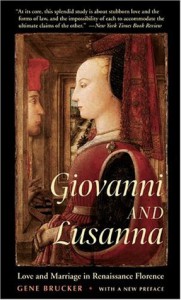Currently reading
Something about a real Renaissance woman

I really like this type of historical non-fiction (probably as much as I hate the postmodernist-ish crap a la "Rhetoric of the body as representation of power and gender in medieval France" - made this up from existing titles :) ) - a real life story based on documents.
(show spoiler)
Florence, first half of the 15C.This is the story of Lusanna, a lower-middle class widow who sued her aristocratic lover and, as she claimed, secret husband Giovanni for bigamy. He in turn, claimed there was no wedding and he'd been free to marry a daughter of another high-ranking family, as he did. She won in the local court but lost when Giovanni appealed to the higher court in Rome.
This story nicely ruins a couple of misconceptions many a modern reader (and even historian) unquestioningly believes in.
1) The assumption about downtrodden women who could not use legal system to defend themselves for this time and place is wrong. Granted, Lusanna lost her case in the end but that was due to her social status, not gender. And corruption, probably - while the local judge who just happened to be a future saint, St. Antonin, could not be bought off, his Roman superiors proved to be more amenable to Giovanni's appeal. It wouldn't be as clear-cut were Lusanna Giovanni's social equal. For example, when a Bardi woman filed for divorce (then termed annulment) from her Acciauoli husband, both of them of powerful families, she got the ruling in her favor.. And were Giovanni a respectable artisan like Lusanna's father and husband were, he would have had no influence in Rome. But then Lusanna probably wouldn't be so keen to snare him. :)
2) Lusanna did get what seems to be a fair trial in her own city, her inferior social position notwithstanding. Giovanni was sweating and influencing witnesses some of whom were his own clients and Lusanna wasn't what a modern court would call a reliable witness herself. She still won.
3) A widow of some means could live pretty much as she pleased and still be respectable. To flaunt her lovers would be unwise, but she didn't have to be particularly discreet either, just observe some conventions. There would be gossip but no shaming. Lusanna having had several lovers before Giovanni (as witnesses attested) didn't make her unfit wife or her claim to marriage invalid in the eyes of these witnesses or the Canon law personified in the Cardinal Antonin.
4) Lusanna didn't seem to have close family ties in the city of Florence, her late father being an immigrant from Croatia, and she had no children. Probably that's what that has made her so assertive - on one hand, she had no recourse but to fight her battles herself, on the other, she was not constricted by her family. Family gave protection and dominated an individual of any gender at the time. And, contrary to what I would have expected, a woman without a family's protection in Renaissance Florence still could seek that protection from the community she was part of and get it.
Generally speaking, it is an interesting case of what a tangle a marriage dispute could prove to be before the official (State and Church) registration was made obligatory for the marriage to be considered valid at all.





 3
3
 7
7